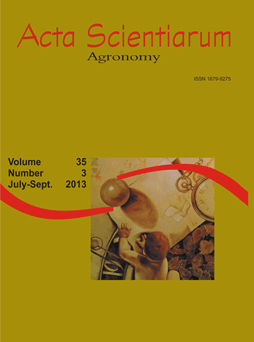<b><i>In vitro</i> culture of <i>Gigaspora decipiens</i> and<i> Glomus clarum</i> in transformed roots of carrot: the influence of temperature and pH</b> - doi: 10.4025/actasciagron.v35i3.16581
Resumo
Monoxenic cultures of arbuscular mycorrhizal fungi (AMF) in transformed roots have been used to better understand the symbiosis with these fungi, but few species have been successfully established in vitro. The object was to establish monoxenic cultures of Gigaspora decipiens and Glomus clarum and to verify the effects of temperature and pH on spore formation. Cultures were established from superficially disinfested spores that were germinated on an agar and water. After germination, the spores were transferred to Petri dishes containing transformed carrot roots. After 4-6 days formed newly formed spores and structures typical. The effects of temperature (22, 25, 28 or 32°C) and pH (4.0, 4.5, 5.5 or 6.5) on the production of spores were assessed over three months, resulting in sigmoidal growth curves. The spore increased from 22°C, reaching higher values 28oC and 32oC there was a reduction in the production. The highest spore production of G. decipiens occurred in a pH of 6.5, whereas for G. clarum was pH of 4.0. The cultivation of other species is still necessary to elucidate particular aspects of the symbiosis that so far are unclear, including the effects of environmental factors on the production of spores of different AMF species.
Downloads
DECLARAÇÃO DE ORIGINALIDADE E DIREITOS AUTORAIS
Declaro que o presente artigo é original, não tendo sido submetido à publicação em qualquer outro periódico nacional ou internacional, quer seja em parte ou em sua totalidade.
Os direitos autorais pertencem exclusivamente aos autores. Os direitos de licenciamento utilizados pelo periódico é a licença Creative Commons Attribution 4.0 (CC BY 4.0): são permitidos o compartilhamento (cópia e distribuição do material em qualqer meio ou formato) e adaptação (remix, transformação e criação de material a partir do conteúdo assim licenciado para quaisquer fins, inclusive comerciais.
Recomenda-se a leitura desse link para maiores informações sobre o tema: fornecimento de créditos e referências de forma correta, entre outros detalhes cruciais para uso adequado do material licenciado.





















































